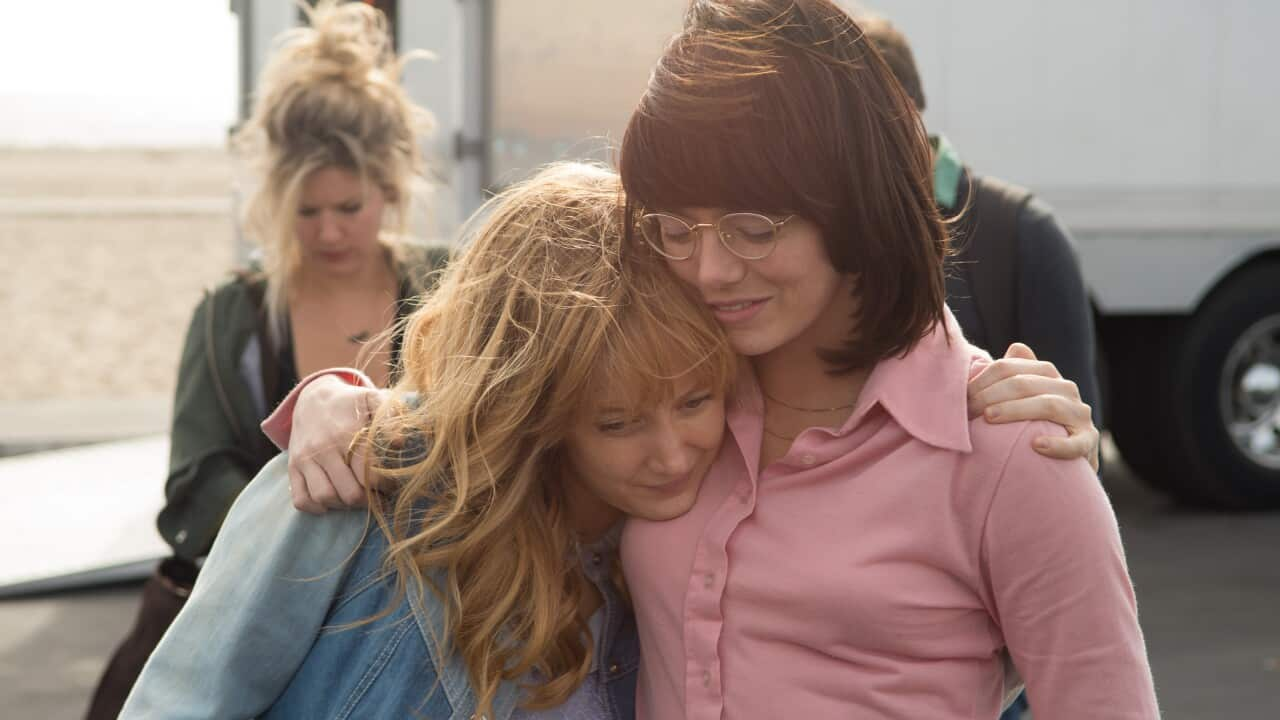Sport and politics don’t mix? Tell that to former world number one tennis player, feminist hero and queer icon Billie Jean King, awarded the National Medal of Freedom by President Barack Obama for her campaigning on women’s and LGBTIQ rights.
A pioneer of the equal pay movement, King put her career on the line for what she believed in. Creating a women-only breakaway tour with World Tennis Magazine publisher Gladys Heldman and ultimately founding the , this public push for equality resulted in the Battle of the Sexes, an exhibition match between the then 29-year-old King and 55-year-old retired champion and showboat male chauvinist Bobby Riggs. The lead up to this pantomime is centre court in the glowing biopic from Little Miss Sunshine directorial team Valerie Faris and Jonathan Dayton.
Starring Oscar-winner Emma Stone as King and her Crazy Stupid Love co-star Steve Carell as Riggs, Battle of the Sexes is written by Slumdog Millionaire screenwriter Simon Beaufoy, mainlining a similarly empowered, sassy joy as recent hit Hidden Figures.
Like tennis balls on grass, reflections of society today bounce along through Battle of the Sexes. A smartly comic laceration of the sexist indignities faced by King, her fellow players, and benefactor Heldman (a cracking Sarah Silverman) - with Bill Pullman’s tour promoter Jack Kramer particularly odious - it’s a clarion call for equal pay for all women.
The movie is also a deeply affecting queer love story, with the bright beacon of marriage equality, so hard fought for and won in America - and still very much in play here in Australia - at its heart. Andrea Riseborough, who appeared alongside Stone in Alejandro González Iñárritu’s Birdman, is radiant as Marilyn Barnett, the real hairdresser who meets and falls for King while the tennis star and her colleagues are on tour. Tagging along for the ride, she falls into bed with King, becoming her lover and then personal assistant as cover.
Andrea Riseborough, who appeared alongside Stone in Alejandro González Iñárritu’s Birdman, is radiant as Marilyn Barnett, the real hairdresser who meets and falls for King while the tennis star and her colleagues are on tour. Tagging along for the ride, she falls into bed with King, becoming her lover and then personal assistant as cover.

Source: 2017 Twentieth Century Fox Film Corporation All Rights Reserved
With an always-excellent Carell having a ball with the high farce of Riggs’ sexist stunts, the first meeting of Barnett and King is a masterclass in understatement. The delicate glow of their salon-set rendezvous is a loaded, tactile foray into each other’s personal space, all floaty hair, nimble fingers and eyes dancing like King on the court. Cinematographer Linus Sandgren casts a hazy aurora that ignites the film’s period-appropriate grainy texture.
Match point
Today, it remains all too uncommon for an elite athlete to come out at the top of their game. Back then, it was much, much tougher, a fact sadly underlined by the tragic off-screen conclusion of King and Barnett's seven-year romance.
While Battle of the Sexes ends with their love still buzzing, their hushed meetings are confined to the shadows off-court, a hint at the societal pressure pushing down. King, who is granted the power to force change in the game, is placed in an impossibly situation. Coming clean over her unexpected love affair with Barnett, conducted behind the back of her husband, coach and manager Larry King (Austin Stowell), would have countless eyes on tabloids, but sponsors bailing in droves. With ramifications well beyond her ruination, the bad press could sink their fledgling movement. As King begins to explore her sexuality, she is scared and confused, as well as emboldened and excited. This allows Stone to flex her considerable acting muscles, portraying a star simultaneously head-over-heels while crippled with game choking self-doubt.

Source: 2017 Twentieth Century Fox Film Corporation All Rights Reserved
Wild Card
The present is also served by the film’s depiction of Margaret Court. Played by Australian star Jessica McNamee - with a permanently pursed lip - her appearances see her portrayed in the same villainous light as Kramer. Though not quite the hard-line Pentecostal preacher she would become post-career, this Court’s still deeply conservative, disapproving of the equal pay movement and a tournament that would see women on the road together, a circumstance she feared would promote homosexuality. Perhaps Faris and Dayton play up her early opposition, but in signalling Court’s eventual opposition to the marriage equality push - which was only just beginning to gain traction in the US during the early '70s following the Stonewall riots of 1969 - Battle of the Sexes knowingly winks at its audience.
Perhaps Faris and Dayton play up her early opposition, but in signalling Court’s eventual opposition to the marriage equality push - which was only just beginning to gain traction in the US during the early '70s following the Stonewall riots of 1969 - Battle of the Sexes knowingly winks at its audience.

Source: 2017 Twentieth Century Fox Film Corporation All Rights Reserved
Bisexual star Alan Cumming steals the show in a radiant cameo as former tennis player, British spy and out gay man turned fashion guru Cuthbert ‘Ted’ Tinling, who frankly merits a spin-off. He designed the dresses worn by countless champions across the years. If King was yet to fully assume the mantle of the LGBTIQ rights champion she would later become, then Cumming, in his final scene with Stone, gets to award her the wild card, predicting a future in which King plays on to shine even brighter.



